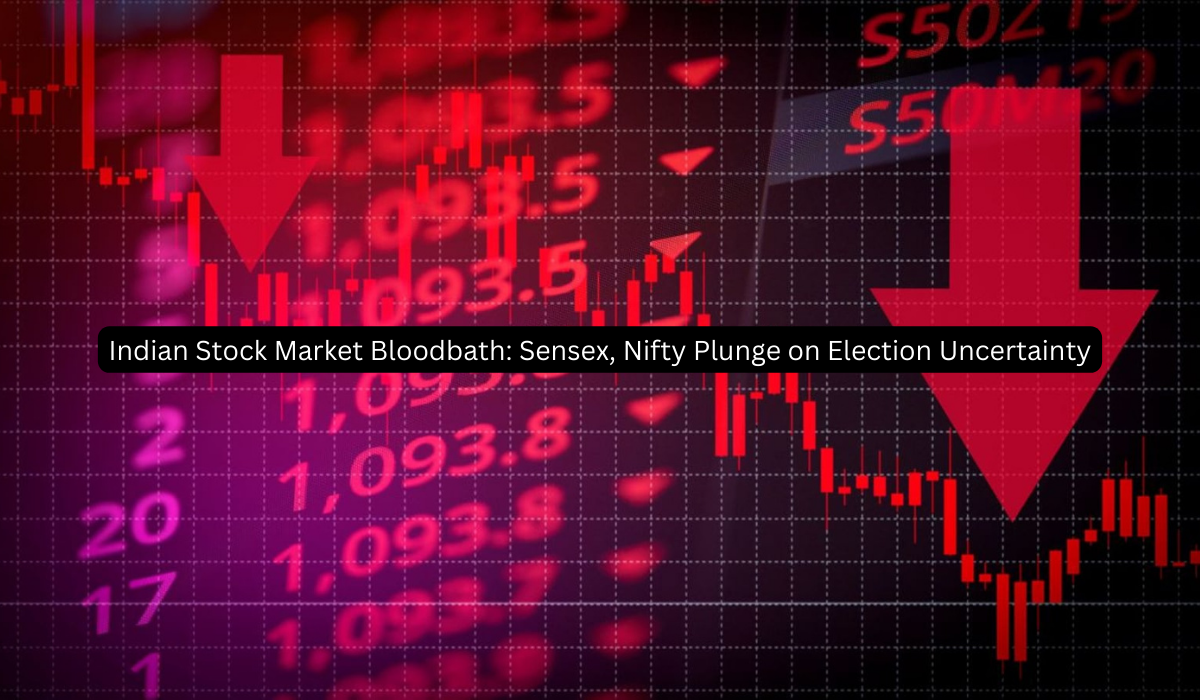The Indian stock market witnessed a brutal sell-off on June 4th, 2024, as the much-anticipated Lok Sabha election results painted a picture of uncertainty. The benchmark indices, Sensex and Nifty, plummeted by a staggering 6%, reflecting investor anxieties over the formation of a stable government. Let’s dive deeper into the events that unfolded and what it means for the markets going forward.
A Market in Shock: Election Jitters Send Investors Running
Polls leading up to the elections had predicted a comfortable victory for the incumbent Bharatiya Janata Party (BJP) led by Prime Minister Narendra Modi. However, early vote counting trends suggested a less decisive outcome. This unexpected development sent shockwaves through the market, leading to a massive sell-off.
Imagine the stock market as a room full of investors. Positive election results were like sunshine streaming in, making everyone feel optimistic. But when the news turned uncertain, it was like a sudden storm, causing everyone to scramble for cover by selling their stocks.
Bloodbath on Dalal Street: Sectors Feel the Heat
The carnage on Dalal Street, the heart of the Indian stock market, was broad-based. Here’s a breakdown of how different sectors fared:
- PSU Banks: These state-owned banks, which benefited heavily from reforms during the previous BJP regime, saw a particularly sharp decline. The Nifty PSU Bank index plunged nearly 8%, reflecting investor concerns about the continuation of reform policies under a less-powerful BJP government.
- IT Stocks: While typically considered defensive plays in uncertain times, some IT stocks like Adani Group companies also witnessed significant declines, possibly due to profit-taking after recent gains.
- Automobiles: The auto sector, which is heavily reliant on consumer confidence, also took a hit, with investors likely anticipating a wait-and-see approach from the new government before making major investments.
This sell-off wasn’t limited to specific sectors. Most major stocks across the board experienced losses, highlighting the broad investor anxiety surrounding the election outcome.
Investor Concerns: Navigating the Uncertainty
Several factors contributed to the market’s decline:
- Formation of a Stable Government: The uncertainty surrounding the formation of a stable government is a major concern for investors. A coalition government might lead to slower decision-making and policy paralysis, which could impact economic growth.
- Continuity of Reforms: Investors are worried about the continuation of economic reforms initiated by the previous BJP government. A change in leadership might lead to a shift in policy priorities, posing risks for businesses.
- Global Market Cues: The overall bearish sentiment in global markets due to ongoing geopolitical tensions and inflation concerns also added to the negative pressure on the Indian stock market.
These anxieties are natural in such a scenario. The Indian stock market thrives on stability and predictability. Uncertainty throws a wrench into investor calculations, leading to a cautious approach.
A Long-Term Perspective: Beyond the Immediate Bloodbath
While the short-term outlook for the Indian stock market appears uncertain, a long-term perspective is crucial. Here’s why:
- India’s Growth Story Remains Intact: India’s economic fundamentals remain strong, with a growing middle class and a young population. These factors will continue to fuel long-term economic growth, providing a positive backdrop for the stock market.
- Government Formation Will Eventually Happen: Regardless of the political composition, a government will be formed. Investors can expect some clarity on policy direction within the next few weeks.
- Historically, Markets Recover: Indian stock markets have a history of bouncing back from setbacks. Investors who remain patient and keep a long-term perspective can benefit from potential future growth.
Remember, the stock market isn’t a one-day game. While short-term volatility is inevitable, the long-term growth story of the Indian economy remains compelling.
Frequently Asked Questions
1. Should I panic and sell all my stocks?
While the market decline is significant, a knee-jerk reaction by selling everything might not be the best strategy. Consider your investment horizon. If you have a long-term perspective (5+ years), staying invested and riding out the volatility can be more beneficial. However, if you need your money in the near future, you might want to adjust your portfolio allocation to minimize risk.
2. Is this the end of the Indian bull run?
It’s too early to predict the end of the bull run. The Indian economy has strong underlying fundamentals, and long-term growth prospects remain positive. The market might experience a correction in the short term, but it’s likely to recover once the political uncertainty clears.
3. Is this a good time to invest in the Indian stock market?
For investors with a high-risk tolerance and a long-term investment horizon (10+ years), a market downturn can present a buying opportunity. Stocks might be available at a discount, offering potential for higher returns when the market recovers. However, careful research and a diversified portfolio are crucial before making any investment decisions.
4. What sectors might be most affected by the election outcome?
Sectors heavily reliant on government policy and spending, like infrastructure and power, might experience some volatility in the short term. However, the long-term outlook depends on the specific policies implemented by the new government.
5. What are some resources to stay informed about the Indian stock market?
Several resources can help you stay informed about the Indian stock market:
- Financial news websites and publications: These provide real-time updates, analysis, and expert opinions on the market.
- Stock market apps: Many mobile applications offer real-time stock quotes, news, and research reports.
- Investment advisors: Consulting a registered investment advisor can be helpful for personalized guidance based on your financial goals and risk tolerance.

